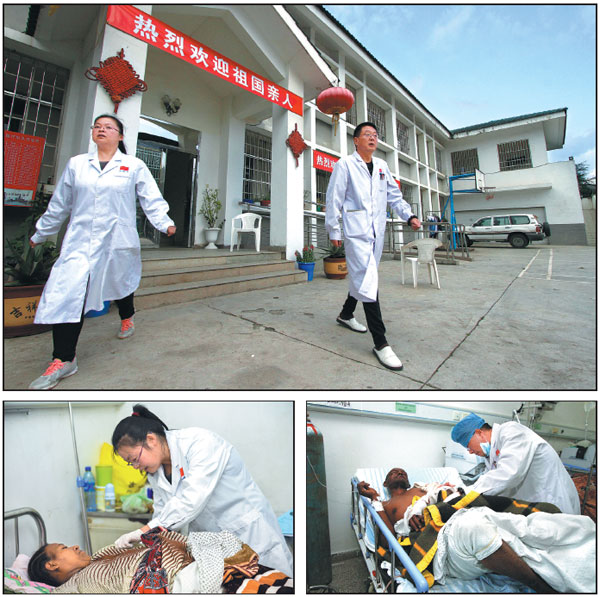Ethiopia receives a healing touch
Chinese medical teams provide valuable medical assistance
Dr Zhang Xiaoyang, 53, is a man on a mission as he paces briskly through the corridors of Tirunesh Beijing General Hospital, on the southern outskirts of the Ethiopian capital of Addis Ababa, on a hot August day. Named after Tirunesh Dibaba, a well-known Ethiopian runner and champion of the 2008 Beijing Olympics 10,000-meter and 5,000-meter races, the hospital was built with Chinese financing and expertise and showcases the multifaceted Ethiopia-China ties.
Opened in March 2012, it has been offering medical services, surgery, HIV screening and other types of healthcare.
Zhang isn't on a one-man volunteer mission - he's been leading a 16-member Chinese medical team working at TBGH to treat Ethiopian patients over the past year, with services ranging from neurosurgery to acupuncture.
|
Opened in March 2012, Tirunesh Beijing General Hospital has been offering health services including internal medicine, surgery and HIV screening. Photos Provided by Xinhua |
As the head of the 19th Chinese medical team in Ethiopia - a unique medical partnership that can be traced back to 1973 - Zhang knows he has a strong historical tie to uphold.
His team hails from China's Henan province, which has sent 19 such teams to Ethiopia over the past 44 years, involving a total of 327 volunteers.
With a 94-year-old father, 88-year-old mother and a son in China, Zhang faces extra challenges to his mission.
"I keep in contact with my elderly parents, my three siblings, wife and son through social media site WeChat text, video and audio messages to cope with homesickness," says Zhang.
He also tries to ease his yearning for home by cooking Chinese food and chatting with his team members.
Zhang isn't the only parent working far from home treating Ethiopian patients at the hospital.
Wang Zhijing, 34, a gynecologist and mother of two, has been helping new mothers and their newborns in the hospital for the past year.
Despite sporadic shortages of medicines and risks with needles when treating HIV-infected patients, Wang is unfazed by potential occupational hazards.
The Chinese doctors' presence has impressed many locals, like Dr Lidet Fekadeslassie.
"It used to be the case that we would give magnesium sulfate to pregnant patients with dangerously high blood pressure through injections, but now I've learned that it can also be given safely through a glucose intravenous infusion," says the 26-year-old medic doctor.
Marealem Worku, 35, a new mother of twins and one of Fekadeslassie's patients, says that with the combined efforts of Wang and Fekadeslassie, she's been receiving excellent treatment that she didn't have when she gave birth to her first child at another hospital.
"Before and after I gave birth, Wang measured my blood pressure, measured my weight and advised me on post-birth self-conditioning, help that even my husband noticed and appreciated," says Worku.
The 19th Chinese medical team in Ethiopia doesn't tell the whole story of Ethiopia-China health cooperation - it is just one part of it.
Earlier this month, at a ceremony attended by outgoing Chinese Ambassador to Ethiopia La Yifan, an agreement was signed to support TBGH's efforts to develop its Trauma Treatment Center and Maternal Child Health Center.
"Even though Ethiopia is a developing country, actually it's a less-developed country. Its government and its people are concentrating very much on the development of healthcare," says La, explaining why China is committed to helping.
At present, both countries are working on the construction on new facilites at the hospital, highlighting the growing Sino-Ethiopian medical and health cooperation.
Kebede Worku, state minister of Ethiopia's Ministry of Health, says that stronger Chinese assistance in the health sector is much needed as more Ethiopians need treatment in noncommunicable diseases.
Over nearly 45 years of working in Ethiopian cities and towns, Chinese medical teams have notched up stories of success and dedication.
Mei Gengnian, head of the first Chinese medical team to Ethiopia, died in 1975 in a car accident while he was serving local communities in Jimma town of Oromia regional state, 380 km south of Addis Ababa.
He was buried near the spot where he died, and his grave is tended by a local family. Mei's son has followed his father's footsteps by joining a medical mission to Ethiopia.
Amid success and dedication, China-Ethiopia health cooperation is continuing to progress as both sides learn valuable lessons from each other.More Ethiopians are visiting the TBGH Chinese Traditional Medicine Center, established in July 2015, to receive acupuncture treatment.
Despite the language barrier and different medical practices, Ethiopian and Chinese doctors agree that they've learned a lot from each other.
Wang says she has learned how to have a better doctor-patient relationship and encourage better preventive health measures during her stay in Ethiopia.
Meanwhile, she urges Ethiopian doctors to learn from the Chinese doctors' experiences and to acquire new skills and knowledge to improve their treatment of patients.
Xinhua

























